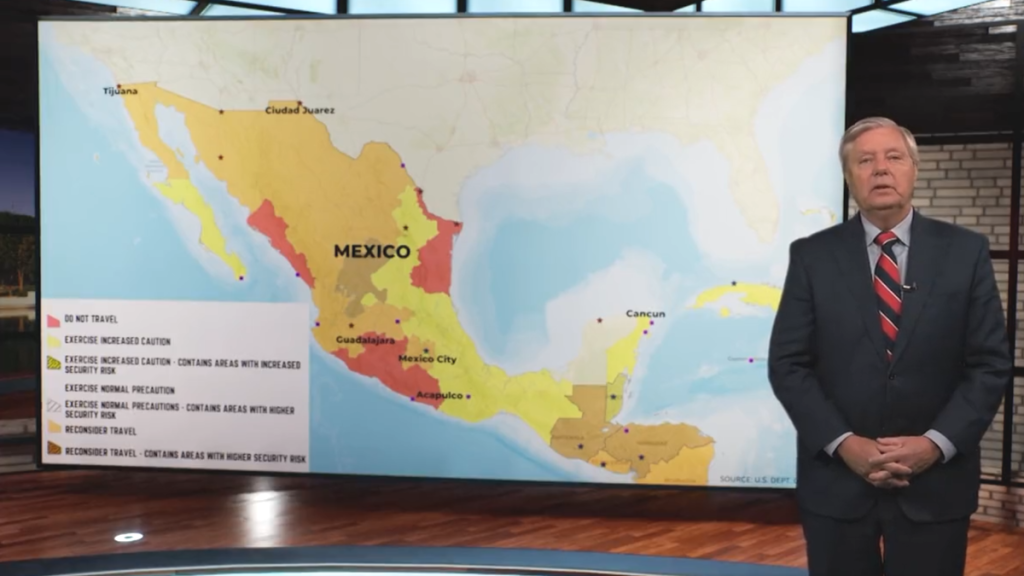While everyone’s attention is still focused on Russia’s military operations in Ukraine or the potential clash between China and the United States over Taiwan, the crisis at the US’s southern border with Mexico has largely fallen by the wayside.
The situation at the southern border is dire to say the least. Since President Joe Biden was installed in office in 2021, 5.5 million illegal aliens have crossed the US’s southern border with Mexico. Tensions have further boiled after 4 African Americans were caught in a cartel shooting in the Mexican state of Tamaulipas in early March. The incident resulted in the deaths of two of the American nationals, while the others were held captive for several days.
Almost immediately, US politicians pounced on this incident to push for some degree of military action against Mexico. During a press conference on March 8, 2023, Sen. Lindsey Graham (R-SC) pushed for designating Mexican drug cartels as terrorist organizations. Graham declared:
“Drug cartels in Mexico have been terrorizing Americans for decades. We are going to unleash the fury and might of the U.S. against these cartels. We are going to destroy their business model and their lifestyle because our national security and the security of the United States as a whole depends on us taking this decisive action.”
The South Carolina Senator added:
“The second step that we will be engaging in is give the military the authority to go after these organizations wherever they exist. Not to invade Mexico. Not to shoot Mexican airplanes down. But to destroy drug labs that are poisoning Americans.”
Rep. Dan Crenshaw (R-TX) used this incident to promote his previously introduced legislation — the Authorization for the Use of Military Force to Combat, Attack, Resist, Target, Eliminate, and Limit, or AUMF CARTEL, Influence Resolution — that would effectively give the US government the power to conduct military operations against drug cartels. Such sentiments are not new in the grand scheme of things.
During the administration of former president Donald Trump, the idea of designating drug cartels as terrorist organizations was considered following a cartel ambush that resulted in the deaths of 9 American nationals. However, Mexican President Manuel Andrés Manuel López Obrador (AMLO) was able to convince Trump to reverse course on such an action.
Nevertheless, the desire to take punitive action against Mexican drug cartels persists as the US suffers alarming levels of drug overdose deaths. In 2021 alone, 71,000 Americans perished due to fentanyl overdose deaths. Mexican drug cartels have been the principal forces bringing fentanyl to the US, which reportedly compelled Trump to even float the idea of launching missiles into Mexico to destroy cartel drug labs.
While none of Trump’s policy desires have come to pass, the calls for taking military action against Mexican drug cartels will not go away. All things considered, is using military force in Mexico to stop cartels a silver bullet to the current crisis at the southern border?
Frankly, a military option will only make matters worse in Mexico. One problem with invading Mexico is the massive refugee influx that will pour into the US. Many of these hypothetically displaced migrants will likely apply for political asylum arguing that the Mexican government is incapable or is not willing to defend them from cartels.
In Mexico’s case, owing to its alarming levels of corruption and inability to contain cartels, migrants can say that Mexican government is a failed state and has no capacity of maintaining public order. A foreign terrorist designation of cartels combined with a US military campaign in Mexico will give scores of Mexican nationals an excuse to claim political asylum. Due to the idiosyncrasies of the American immigration system, these kinds of migrants will not be expelled from the US and sent back to Mexico. This will only exacerbate the US’s present problems with mass migration.
It’s also an open secret that Mexican cartels are active on both sides of the border. There are some parts of the US that are now under cartel control. A potential war in Mexico could easily spill over into the US, with Mexican cartels and their American cells taking retaliatory actions against American nationals in both of these countries.
In a hypothetical US invasion of Mexico that goes awry, it would not be far-fetched to imagine calls by certain factions of the American ruling class to create a hemispheric government to address Mexico’s institutional corruption and stabilize the region once and for all. Keep in mind, we’re dealing with a political class that takes the axiom of never letting a crisis go to waste to heart. Due to the globalist inclinations of the US’s ruling class, an invasion of Mexico could be the perfect Trojan Horse for the eventual formation of a North American Union comprised of Canada, Mexico and the United States.
Despite the challenges the US is facing at its southern border, there are more reasonable alternatives to solving this problem. They will consist of bolstering border security, deporting illegal aliens, and cracking down on cartel activity within its borders. None of this involves having to invade Mexico or taking military action there.
Unfortunately, the US may need to undergo a de facto regime for such nationalist policies to take root. The current configuration of its political leadership is one that is still committed to maintaining porous borders and using military force to solve all its problems. A more nationalist, America First political class is needed to address the southern border situation in a way that respects national sovereignty while also securing peace and prosperity for the North American region.
